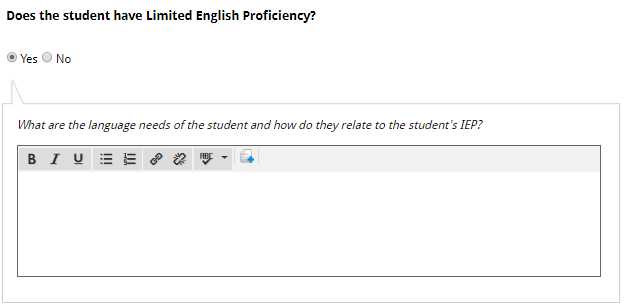

Students who have been identified as Limited English Proficient (LEP) have scored between a 1.0 and a 6 NE (Pre-functional to Initially Proficient) on the SC English Language Proficiency assessment. All students identified as LEP must participate in the state’s LEP Test (ACCESS or Alt-ACCESS) annually until they receive a score above 6NE. In addition, all students identified as LEP will have an Individualized Accommodations Plan and may receive services or monitoring through the English for Speakers of Other Languages (ESOL) Program.
If a student with Limited English Proficiency (LEP) is suspected of having one or more disabilities, the district must plan and carry out an evaluation within the designated guidelines and timelines. The evaluation team must keep in mind that there must also be evidence of the disability in the student’s native language and not only in the English language. It is crucial that the evaluation team make the distinction between a language difference and a disability.
Materials and procedures used to assess a child with limited English proficiency shall be selected and administered to ensure that they measure the extent to which the child has a disability and needs special education, rather than measuring the child’s English language skills.
Federal and state regulations are very clear with regard to the fact that a child must NOT be determined to be a child with a disability primarily as a result of limited English proficiency. (34 CFR § 300.309(a)(3)).
The LEA must make reasonable efforts to ensure that the parents of students who are limited English proficient understand, and have the opportunity to participate in any meeting included as part of the IEP process, including arranging for an interpreter for parents whose native language is other than English. Interpreter arrangements must be made through HIT Services. Should there be available school personnel at individual locations who speak another language (i.e. Spanish), these individuals may assist the Case Manager in setting up the meeting. However, it is not permissible for these individuals to attend IEP or related meetings as an interpreter.
In addition to the required participants under IDEA, the IEP team must also include a team member knowledgeable about the student’s language needs. This may include the student’s ESOL service provider, the student’s General Education teacher if dually-certified in general education and ESOL, the student’s Special Education teacher if dually-certified in special education and ESOL, or another team member who is knowledgeable about the student’s language needs.
Should the ESOL service provider be unable to attend the IEP meeting, the ESOL provider will work with the Special Education Case Manager to identify all necessary information to ensure that the IEP team is able to fully consider the student’s language needs. This must include a review of the ESOL Accommodations Plan. If the ESOL provider is unable to attend the meeting, the Case Manager should provide them with the “ESOL Program Information for Students with Disabilities” form well in advance of the IEP meeting to complete and return to the Case Manager. This form should be completed at Annual Review and, if necessary, at any other meeting in which language needs are being discussed. Information in this form should be used to document Limited English Proficiency strengths and needs within the IEP but should not be included in the student’s special education record. This form should be kept with progress monitoring records.
Link to ESOL Program Information for Students with Disabilities Form
When interpreters are required for IEP meetings, Language Line Solutions, a call-in interpreter service, will serve as the primary interpreter service. Please use the link to access the document entitled “Quick Reference Guide: LanguageLine Solutions” for support with this process. However, In some circumstances, it may be more appropriate to use a Greenville County Schools’ trained interpreter. If you believe your situation requires a Greenville County School interpreter rather than an interpreter accessed through Language Line Solutions, contact your Special Education Specialist to discuss.
Once a student with LEP is identified as a student with a disability, the student’s language needs AND disability-related educational needs must be addressed. The IEP team must consider the language needs of the child who has limited English proficiency as those needs relate to the development of the IEP including the impact of how service providers communicate with the student and progress is measured. Throughout the development of the IEP, ALL strengths and needs will be considered, beginning with the Consideration of Special Factors.

The instruction related to English language acquisition provided by an ESOL teacher may vary based upon the accommodations and modifications recommended by the IEP team. This instruction may not always involve direct services from an ESOL teacher, but may take the form of collaboration between the ESOL teacher, special education teacher, and the general education teacher. These services are not documented as services in the IEP but will be considered by the team through documentation in the Consideration of Special Factors and Present Levels of Academic Achievement and Functional Performance, as necessary. It is not permissible for specialized instruction provided through an Individualized Education Program (IEP) to supplant ESOL services related to the student’s language needs.
The Tools and Resources for Addressing English Language Learners with Disabilities document provides Special Education Service Providers with valuable information related to English Language Learners with Disabilities. This document contains 5 helpful tools to help schools appropriately identify and service students with limited English proficiency with disabilities:
To continue to the next section Parentally Placed Private School Students (PPPSS), click Next Below.
IDEA and Students with Limited English Proficiency